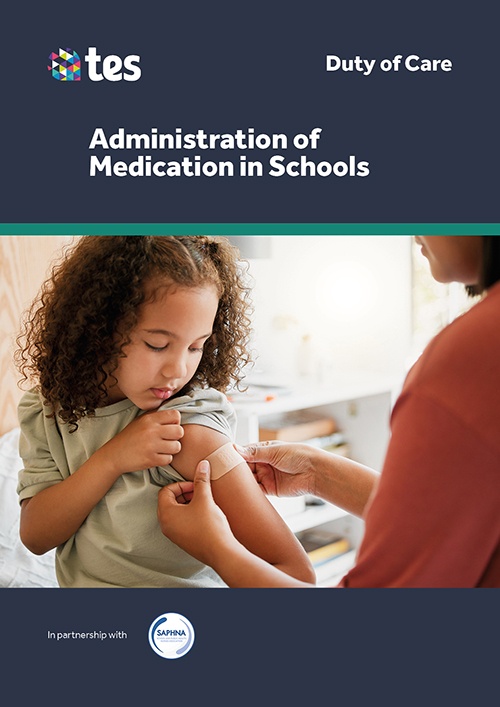
What is an Individual Health Care Plan (IHCP)?
Medication may be required for a short period of time or just a single dose. However, for children with ongoing medical needs, it may be for a longer term or on a continual basis. Those that have continuing health needs should have an individual health care plan (IHCP) that is reviewed annually or earlier if the child’s needs change. Parents should be consulted when developing an Individual Health Care Plan and any relevant health professional should also be involved. Procedures should also be put in place for
Individual Health Care Plans are developed in partnership between the school, parents, pupils, and the relevant healthcare professional who can advise on a child's case. The aim is to ensure that schools know how to support your child effectively and to provide clarity about what needs to be done, when and by whom.
How should you prepare an IHCP?
When developing an Individual Health Care Plan the following should be considered:
- The medical condition, signs, symptoms and treatments.
- The child’s resulting needs, including medication.
- The level of support needed - If a child is self-managing their medication, this should be clearly stated with appropriate arrangements for monitoring.
- Who will provide this support and their training
needs. - Arrangements for written permission from parents and the headteacher for medication to be administered by a member of staff or self-administered by the pupil during school hours.
- Arrangements for school trips or other school activities.
- What to do in the event of an emergency, including who to contact, and contingency arrangements.
What is the process for developing an Individual Health Care Plan?
Step 1 | Inform the school
A parent or healthcare professional informs the school that the child has been newly diagnosed, or is due to attend a new school or is due to return to school after a long-term absence, or that needs have changed.
Step 2 | Meeting to discuss the child's medical support needs
Headteacher or a senior member of school staff to whom this has been delegated co-ordinates meeting to discuss the child’s medical support needs, and identifies a member of school staff who will provide support to the pupil.
Step 3 | Agree on need for IHCP to include key parties
Meeting to discuss and agree on the need for IHCP to include key school staff, the child, parent, relevant healthcare professional and other medical/health clinician as appropriate (or to consider written evidence provided by them).
Step 4 | Develop the IHCP in partnership
Develop the IHCP in partnership - agree who leads on writing it. Input from a healthcare professional must be provided.
Step 5 | Identify school staff training needs
Step 6 | Implement IHCP and circulate to all relevant staff
Step 7 | Review IHCP annually or when condition changes
The parent or healthcare professional to initiate.
If a child has special educational
What should an Individual Health Care Plan include?
We have a template that you can use and adapt to suit your requirements. Click here to download a PDF version.
Administration of Medication in Schools online training course
This information was extracted from our new online training course which has been written in partnership with SAPHNA – Administration of Medication in Schools.
The course contains statutory and non-statutory guidance on the operation of a system to administer medicine in schools and the responsibilities of staff and parents.
The purpose of the course is to help learners understand:
- The laws that apply to the administration of medication
- The principles for safe practice in administering medication
- The training requirements for schools, including how to administer prescribed medicine and awareness training for relevant medical conditions
- The requirements for record keeping, including consent forms and records of all medicines administered to individual children
- Planning for activities outside of school, such as school trips and residential visits
- The policies and procedures schools should have in place
The course costs £18.50 to buy online or is included in our comprehensive package of safeguarding and duty of care training courses. The package contains over 30 essential courses to help train staff and evidence compliance to inspectors.
Cost-effective training
Our online learning service represents fantastic value for money, as rather than paying on a per-course, per-learner basis, ALL courses within the package are available on an unlimited basis. This means that all teachers, support staff, new starters, governors and volunteers can all access every course for just one annual price.
Costs are based on pupil-roll numbers and start at just £370 per year.
To find out more or request a quote, please get in touch today.
Never miss an update
To receive the latest news and offers, click below
Related content:
Administration of Medication in Schools
Schools and early years settings must have a policy and procedures in place for the administration of medication to children and young people. This course contains statutory and non-statutory guidance on the operation of such a system and the responsibilities of staff and parents.
Read moreAdministration of Medication in Schools
The purpose of this course is to help you understand:
- The laws that apply to the administration of medication
- The principles for safe practice in administering medication
- The training requirements for schools, including how to administer prescribed medicine and awareness training for relevant medical conditions
- The requirements for record keeping, including consent forms and records of all medicines administered to individual children
- Planning for activities outside of school, such as school trips and residential visits
- The policies and procedures schools should have in place

